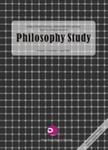The Grammars of Mystical Experience in Christian Theological Dialogue
The Grammars of Mystical Experience in Christian Theological Dialogue作者机构:University of Puerto Rico
出 版 物:《Journal of Philosophy Study》 (哲学研究(英文版))
年 卷 期:2018年第8卷第4期
页 面:151-168页
学科分类:01[哲学] 0101[哲学-哲学] 08[工学] 010108[哲学-科学技术哲学] 0835[工学-软件工程] 081202[工学-计算机软件与理论] 0812[工学-计算机科学与技术(可授工学、理学学位)]
主 题:phenomenology grammar mysticism theology ontology dialogue music silence
摘 要:The philosophical horizon of this essay is theoretically comparative and hermeneutically dialogic. Its main philosophical and theological tonality expresses, in first person and through three discursive moments, the differentiated fusion of horizons between phenomenological and grammatical description and understanding of experience. After a philosophical overture-outlining the ethos of the dialogic problematic and situating it within the contemporary diverse and dialogic dynamic of phenomenology-I will expose the consistent, possible modalities of convergence between Husserlian phenomenology and Wittgensteinian grammar of the mystical shapes of experience. The tense, responsorial dialogue among Husserl, Heidegger, Levinas, and Wittgenstein's styles of thinking, far from being anymore limited to the debates between the analytical and phenomenological, will be considered from the crossed categorial spaces of Austrian philosophy and German culture in general. In a second section, I will show how the styles of phenomenology today are advancing into a cautious micro-logical grammar of comparative inquiry. This thematization will first consider some precise semantic clarifications: Experience, the mystical, extasis, evidence, and truth; in a second section, the theoretical levels of grammar and phenomenology of mystical experience are heralded in the context of the Christian theological dialogue, where I emphasize the rebirth of French theological thinking and dialogic transcendence, beginning with Maritain and de Chardin to Marcel, de Lubac, Levinas, and Marion. Finally, I consider the aesthetic expressions of mystical experience, both from the visual and musical dimensions. I will conclude this talk by highlighting theological perspectives drawn from my research in musico-philosophical problematics, through an awakening to the resonance of Being and the Divine in sonic and musical life. Through a theology of the musical λογοζ, the grammar of mystical experience reveals



